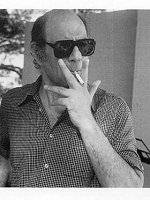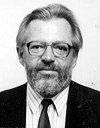With two concerts at the Queen Elizabeth Hall the London Sinfonietta
provided the platform for a miniature retrospective of Mauricio Kagel,
the Argentine composer who, since his arrival in Germany in 1957, is firmly
based in Cologne. Kagel certainly does not suffer from overexposure in the
UK. Nevertheless, some of his works are played from time to time with variable
success (see S&H July 1999, A Mauricio Kagel evening).
I felt sad about the poor attendance at both events, which said much about
the contemporary music audience here. From my observation over the years
it seems not so open-minded as one would wish, but very much split into different
camps and followers of specific composers.
Mauricio Kagel' s music does not fit any perspective; it is unique in its
divergence and wants to be heard and observed without any reservations. The
risks he takes are intentional and never-ending. Each performance is a risk
in itself.

What to make of a concert which breaks deliberately with everything possible,
which assembles incommensurable magnitudes, which irritates by being
double-bottomed to various degrees, which engages in surrealism, parody,
collage, cabaret, black theatre and nonsense? Kagel asks his audience to
follow him unconditionally, to accept all kinds of contradictions. He hates
any continuity and formal consistency. "It has always been my intention
to tie together as many situations as possible. From a work of art I demand
that it incorporates boundless dimensions. I do not like pedagogical works,
because I mistrust the mere practical application. I prefer to create works
as complex as possible, which allow everybody to find one' s own very personal
relationship and which allow me to see them with fresh eyes even years after.
I do not want anything final and under no circumstances I want any model;
models - that is what I hate."
Each interpretation of a work by Kagel only lives up to its expectations
fully when he has the chance to work with the musicians, to explain his
intentions and to demonstrate the theatrical effects. No notation could ever
incorporate all the information necessary to translate his multiple points
of view. His diverse visions are not only bizarre and provocative, they are
accessible and a lot of fun, as long as one follows them unbiased.
The first concert had indeed the advantage of Kagel's presence, which gave
the occasion its flair of authenticity. Match (1965), a dialogue
for two celli (Anssi Kartunen & Sally Pendlebury) with
percussionist David Hockings, who 'played' the umpire, reminded me
of those extremely serious, but also very entertaining, musical happenings
with John Cage and friends in the 60s. It is not only a match in sounds,
but also in physical reactions, keeping the umpire busy.
Lieuwe Visser (Bass) was the soloist in Fürst Igor,
Strawinsky (1982), and Kagel's three-dimensional tribute on the occasion
of the tenth anniversary of Strawinsky's death. Based on the original Russian
text of Prince Igor' s aria from the second act of Borodin's opera, it deals
simultaneously with the imprisonment in exile of Prince Igor, the emigrant
Strawinsky and the experiences of the Argentinean, Mauricio Kagel, in his
self-imposed German exile. Even in this piece, theatrical effects play an
important part and create an atmosphere of ambiguity.
After the interval, Oliver Knussen conducted Kantrimiusik
(1973-5), one of Kagel' s most distinctive confrontation with folk music
and its misuse. "How often one regrets the fate of folklore in being obliged
to serve the community as interpreter and entertainer simultaneously."
The more than adequate soloists were soprano Angela Tunstall, mezzo Susan
Bickley and the tenor Alan Belk. Those eight movements and seven song interludes,
to collages of letters or bizarre word combinations, are a diabolic satire,
which also allows space for bitter-sweet humour. The whole evening had been
an entire delight.
The second programme was devoted to a rare performance of all the eight movements
of the cycle The Compass Rose (1988-94). The instrumentation
for clarinet, piano, harmonium, two violins, viola, cello, double bass and
a huge percussion section challenges Kagel' s survey of the various compass
directions and his very personal views. Each section lasts between 6 and
21 minutes, whereby some are heavily overstretched. Kagel' s intellectual
thoughts, printed in the programme book, are certainly interesting, but were
no compensation for the absence of the composer.
Despite the experienced Dutch conductor Reinbert de Leeuw being in
charge, I felt for once uncomfortable with the members of the London Sinfonietta,
without questioning their unchallengeable musicianship. They put all their
energy into the score, but the vital theatrical element was either not convincing
enough or totally missing - with the exception of the percussion player
David Hockings. He worked like the most precise maniac, using more
than a hundred known and newly invented percussion instruments, as well as
playing all sorts of folk flutes and the Jew' s harp. In the final moments
of The Compass Rose, and exactly in time with the conductor's
rapid beat, he swung an axe again and again, splitting a huge tree trunk
into two and covering the musicians with splinters! Why not? The effect sounded
all right and was well devised.
CD suggestion: Fürst Igor is included on Accord 201262,
with Finale and Vox Humana? in which the narrator is Mauricio
Kagel.
Hans-Theodor Wohlfahrt
 It
gives me great pleasure to welcome to the
Seen&Heard team Hans-Theodor
Wohlfahrt, distinguished UK music correspondent of many European
publications, including Neue Zeitschrift für Musik; Neue
Züricher Zeitung and Der Standard (Vienna). Theo intends
that his involvement will "circle around the unknown, around events I
travel to, around composers I feel should be known, and around positive and
negative trends". His contributions will enhance the international
orientation of S&H, first
demonstrated in our coverage of the Strasbourg Musica99 festival.
It
gives me great pleasure to welcome to the
Seen&Heard team Hans-Theodor
Wohlfahrt, distinguished UK music correspondent of many European
publications, including Neue Zeitschrift für Musik; Neue
Züricher Zeitung and Der Standard (Vienna). Theo intends
that his involvement will "circle around the unknown, around events I
travel to, around composers I feel should be known, and around positive and
negative trends". His contributions will enhance the international
orientation of S&H, first
demonstrated in our coverage of the Strasbourg Musica99 festival.

 Return to:
Return to: